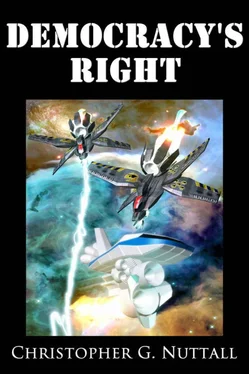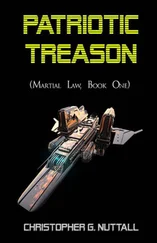He controlled himself with an effort. “Nix, you are in violation of Imperial Navy Regulations,” he stated, flatly. The formal charge could wait until Colin had a chance to do the paperwork. His lips twitched. He’d led his comrades into rebellion and he was still worrying about paperwork! “Do you wish to face Captain’s Mast or the judgement of your fellow crewmates?”
Nix blanched, his face turning even paler. Colin — or an Imperial Navy Captain, seeing that Colin had effectively resigned from the service — could legally issue any punishment he liked on his ship, up to and including execution. And his crewmates wouldn’t be any kinder. They would know that he’d put their lives in danger and wouldn’t hesitate to issue harsh punishment. His life wouldn’t be worth living until he quit — as if he could quit now — or someone managed to kill him and make it look like an accident. Yet, by long tradition, Captain’s Mast was inviolate. If Colin didn’t kill him, his crewmates wouldn’t kill him either.
But then, Colin knew, tradition was increasingly worthless these days.
“I choose Captain’s Mast,” Nix said, finally. He lowered his gaze to the floor. “I will submit to your judgement.”
You’re going to regret that , Colin thought, coldly. “Very well,” Colin said. “Crewman Nix, you are demoted to Crewman Fourth Class, with all the attendant reduction in pay and rights. Your work will be monitored by the NCOs who will not hesitate to administer punishment should you make additional… mistakes. In addition, you will receive ten lashes in front of the crew tomorrow after First Quarter. Do you accept the punishment?”
Nix swallowed hard. Technically, he could try to refuse, but the thought was absurd. Colin had let him off lightly and they both knew it. “Yes, sir,” he said. Lashing was rare in the Imperial Navy and almost always reserved for gross incompetence or misjudgement. “I will accept the punishment.”
Colin looked up at the Marines. “Take him back to his sleeping quarters and have him organise his possessions,” he ordered. “He is to be transferred to the Fourth Class quarters and assigned a bunk there until further notice.”
“Yes, sir,” the lead Marine said. Unlike Nix, his voice was brisk and focused. Marines normally served as police onboard warships, breaking up fights between the crew and maintaining discipline. If the reports were accurate, Percival had replaced the Marines on his ships with Blackshirts. Colin smiled at the thought. Percival could hardly have encouraged the rebels — and mutinous tendencies among his crews — more if he’d ordered them to gun down their own families. “Come along, you.”
Colin watched as Nix was marched out of the compartment and then closed his eyes, cursing his luck. Nix was one of the crewmen who just sought to wander through life, uncaring about any higher cause, not even focused on possible promotion. It wasn’t an uncommon type, yet Colin couldn’t afford them on his ships. It wasn’t as if he had the might of the Imperial Navy and Imperial Intelligence behind him. He might act like a Captain in the Imperial Navy, yet Nix could point out — quite rightly — that he’d walked away from the service and therefore had no command rights.
But then, Nix had never been taught to think. The Imperial Navy recruited its lower decks crewmen from poorer worlds, gave them a little rote training and sent them out to pick up the rest on the job. Nix knew nothing, Colin suspected, about how the starship he was serving on actually worked, perhaps not even why an air scrubber was so important. The NCOs worked overtime to keep the new recruits from killing themselves, knowing that they would be blamed if one of the newcomers accidentally blew up the ship. The senior officers, who had been through the Academy as cadets of rare promise (or so Colin had been told) rarely understood what happened below decks.
There were ships where a good cadre of NCOs and a caring commanding officer ensured that they were a joy to serve on… and ships that were hellish nightmares for young crewmen, or even junior officers. The lower decks were dominated by thuggish crewmen, who bullied recruits out of their pay, created stills for illegal consumption of alcohol and — often — far worse. Colin knew all about the abuse of power practiced by Admiral Percival, Stacy Roosevelt and their twisted kin, but the lower decks could match their sadism, if not their sophistication. He wondered absently if Stacy Roosevelt had known about the powder keg under her feet, before realising that it was unlikely. She wouldn’t have cared if she had.
Back when Colin had been promoted to Commander and serving as the XO of HMS Shadow , he had made it his business to understand and tame the lower decks. It was ironic, but his exile at Percival’s hands had introduced him to a whole new side of the Imperial Navy, one he had never realised existed. And he’d won; he’d cleaned out the bullies and convinced the NCOs to support him. After the war, once the Empire had started to reform, Colin intended to ensure that the lower decks became safe places to work. The bullies could take a short trip out of the airlock in their underwear.
Shaking his head, he turned back to the report from Flag Captain Jeremy Damiani, who had been doing his own checks on the other side of the superdreadnaught. Colin knew that he had stepped on the man’s toes mercilessly, but he knew that there wasn’t any choice — and besides, he needed to be intimately familiar with the superdreadnaught. Damiani hadn’t been allowed to clean out the problems on his own ship — Stacy Roosevelt had refused him permission to do anything of the sort, although Colin had no idea why — and he had been horrified by what he’d found. Colin had been more pragmatic, if only because he’d seen worse. There were starships in the Imperial Navy that were not, in truth, commanded by their Captains.
He placed the datapad aside and stared up at the tactical star chart glowing in front of him. On the way back from Piccadilly, they’d hit two smaller worlds, wiping out a pair of Imperial Navy facilities in one and looting the other, where Percival had created a small resupply base for his ships. Colin had wondered if it had been a trap — it was odd for Percival to show so much forethought — so he’d gone in carefully, only to loot the station and flicker out — as far as he could tell — without any pursuit. If someone drew the three points he’d attacked on a star chart, they’d see them running in a line towards the Rim, but not towards the parts of the Rim that were part of the Popular Front. It might waste some of Percival’s time and resources.
Colin grinned to himself. As far as he could tell, Percival’s only hope was that Colin would expose himself, allowing one or both of Percival’s superdreadnaught squadrons the chance to intercept him and break his force. Percival was doubtless already trying to search the Rim for his base — or his supporting elements — but that would be a thankless task. The Rim and the Beyond was vast, with hundreds of hidden colonies; Percival would have some problems tracking down and locating the right one. The prospect of betrayal was far more serious, but Colin had taken ample precautions. The vast majority of the Rim’s citizens had no idea where he was based and Colin intended for it to stay that way.
And then there was the message. Hester had written the basic message, and then Colin and Daria had worked on it, refining their statement to the Empire. It had been calculated to inspire potential rebels all across the Empire, but at the same time to discourage futile uprisings. And, hopefully, it would give Percival heart failure. Colin suspected that news of the rebellion was already going to Earth, regardless of what Percival had ordered, yet… would they replace him with someone more competent? He shook his head. It didn’t really matter. It would take just under six months for his message to get to Earth and another six months for any new orders to reach Percival. By then, Colin would either have defeated Percival or died in an expanding ball of radioactive plasma.
Читать дальше












